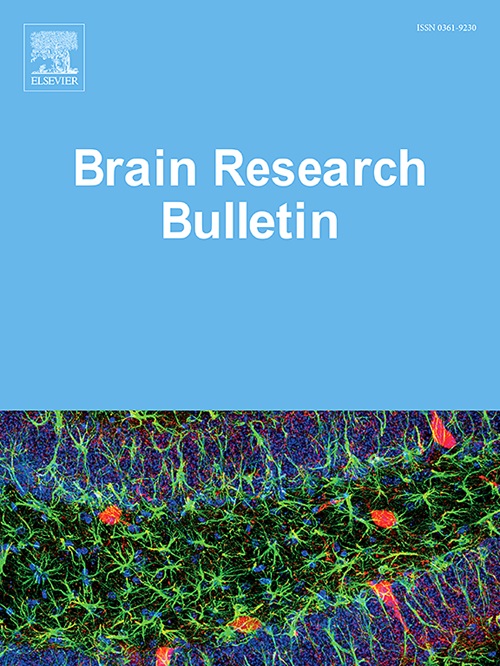Dl-3-正丁基苯酞通过调节蛛网膜下腔出血后的NLRP3炎性体,减轻早期脑损伤和迟发性神经功能障碍。
IF 3.5
3区 医学
Q2 NEUROSCIENCES
引用次数: 0
摘要
蛛网膜下腔出血(SAH)是一种严重的神经系统疾病,缺乏有效的治疗手段。早期脑损伤(EBI)和迟发性神经功能障碍是导致蛛网膜下腔出血患者预后不良的重要原因。核苷酸结合寡聚化结构域(NOD)样受体含吡啶结构域3(NLRP3)炎性体的激活与包括 SAH 在内的许多炎症病变病因有关。据报道,Dl-3-正丁基邻苯二甲酸盐(NBP)具有很强的抗炎特性,对多种神经退行性疾病有益。然而,NBP 对 SAH 的影响和分子机制尚未明确。本研究旨在探讨 NBP 对 EBI 和 SAH 后延迟性神经功能障碍的影响,并揭示其可能的内在机制。成年小鼠接受血管内穿孔 SAH 模型或假手术。小鼠随机分为假手术组、SAH 组和 SAH+NBP 组。SAH术后48小时进行EBI(短期研究),SAH术后21天进行迟发性神经功能障碍(长期研究)。结果表明,NBP 能明显减轻小鼠在脑梗死后 48 小时的 EBI,表现为神经系统评分升高、脑水肿减轻、血脑屏障破坏、神经元丢失和星形胶质细胞聚集减少,以及脑血管痉挛得到改善。此外,NBP 还能改善 SAH 后 21 天的长期神经行为功能,减少神经元凋亡。值得注意的是,NBP 还能抑制 EBI 和 SAH 引起的延迟性神经功能障碍中 NLRP3、ASC、caspase-1、cleaved-caspase-1、IL-1β、IL-18、GSDMD 和 GSDMD-N 的表达。我们的研究结果表明,NBP治疗对SAH诱导的早期脑损伤和延迟性神经功能障碍具有深远的神经保护作用,至少部分是通过调节NLRP3炎症小体信号通路及其相关的炎症和脓毒症。本文章由计算机程序翻译,如有差异,请以英文原文为准。
Dl-3-n-Butylphthalide attenuates early brain injury and delayed neurological dysfunction by regulating NLRP3 inflammasome after subarachnoid hemorrhage
Subarachnoid hemorrhage (SAH) is a severe neurological event lacking of effective therapy. Early brain injury (EBI) and delayed neurological dysfunction are important cause in the poor prognosis of patients with SAH. Nucleotide-binding oligomerization domain (NOD)-like receptor pyrin domain containing 3 (NLRP3) inflammasome activation has been implicated in many inflammatory lesion pathogeneses including SAH. Dl-3-n-butylphthalide (NBP) has been reported to possess substantial anti-inflammatory properties, which is beneficial for various neurodegenerative diseases. However, the effect and molecular mechanisms of NBP on SAH have not been clearly identified. We designed this study to investigate the effect of NBP against EBI and delayed neurological dysfunction after SAH and to reveal the possible underlying mechanism. The adult mice were subjected to endovascular perforation SAH model or sham operation. Mice were randomized to sham group, SAH group, or SAH+NBP group. The EBI (short-term study) was studied at 48 h post-SAH and delayed neurological dysfunction (long-term study) at 21 days post-SAH. The results suggested that NBP evidently alleviated the EBI in mice at 48 h post-SAH, as shown by elevating neurological score, reducing brain edema, blood–brain barrier disruption, neuronal loss, and astrocyte aggregation, as well as ameliorating cerebral vasospasm. Moreover, NBP was able to improve long-term neurobehavioral functions and decrease neuronal apoptosis at 21 days after SAH. Significantly, NBP treatment also inhibited the expressions of NLRP3, ASC, caspase-1, cleaved-caspase-1, IL-1β, IL-18, GSDMD and GSDMD-N in both EBI and delayed neurological dysfunction induced by SAH. Our findings suggested that NBP treatment exerts a profound neuroprotective effect against early brain injury and delayed neurological dysfunction induced by SAH, at least partially through regulating NLRP3 inflammasome signaling pathway and its related inflammation and pyroptosis,
求助全文
通过发布文献求助,成功后即可免费获取论文全文。
去求助
来源期刊

Brain Research Bulletin
医学-神经科学
CiteScore
6.90
自引率
2.60%
发文量
253
审稿时长
67 days
期刊介绍:
The Brain Research Bulletin (BRB) aims to publish novel work that advances our knowledge of molecular and cellular mechanisms that underlie neural network properties associated with behavior, cognition and other brain functions during neurodevelopment and in the adult. Although clinical research is out of the Journal''s scope, the BRB also aims to publish translation research that provides insight into biological mechanisms and processes associated with neurodegeneration mechanisms, neurological diseases and neuropsychiatric disorders. The Journal is especially interested in research using novel methodologies, such as optogenetics, multielectrode array recordings and life imaging in wild-type and genetically-modified animal models, with the goal to advance our understanding of how neurons, glia and networks function in vivo.
 求助内容:
求助内容: 应助结果提醒方式:
应助结果提醒方式:


